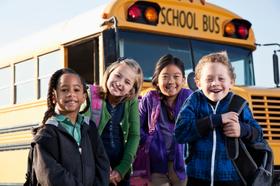For the 2024 school year, there are 6 public preschools serving 3,315 students in Fayetteville, AR. The top ranked public preschools in Fayetteville, AR are Holcomb Elementary School, Butterfield Elementary School and Happy Hollow Elementary School. Overall testing rank is based on a school's combined math and reading proficiency test score ranking.
Fayetteville, AR public preschools have an average math proficiency score of 50% (versus the Arkansas public pre school average of 43%), and reading proficiency score of 42% (versus the 36% statewide average). Pre schools in Fayetteville have an average ranking of 7/10, which is in the top 50% of Arkansas public pre schools.
Minority enrollment is 44% of the student body (majority Hispanic and Black), which is more than the Arkansas public preschool average of 40% (majority Black).
Best Public Preschools in Fayetteville, AR (2024)
School
(Math and Reading Proficiency)
(Math and Reading Proficiency)
Location
Grades
Students
Rank: #11.
Holcomb Elementary School
(Math: 63% | Reading: 54%)
Rank:
Rank:
10/
Top 10%10
2900 N Salem Rd
Fayetteville, AR 72704
(479) 527-3610
Fayetteville, AR 72704
(479) 527-3610
Grades: PK-4
| 644 students
Rank: #22.
Butterfield Elementary School
(Math: 63% | Reading: 52%)
Rank:
Rank:
10/
Top 10%10
3050 N Old Missouri Rd
Fayetteville, AR 72703
(479) 444-3081
Fayetteville, AR 72703
(479) 444-3081
Grades: PK-4
| 530 students
Rank: #33.
Happy Hollow Elementary School
(Math: 55-59% | Reading: 45-49%)
Rank:
Rank:
9/
Top 20%10
300 S Ray Ave
Fayetteville, AR 72701
(479) 444-3085
Fayetteville, AR 72701
(479) 444-3085
Grades: PK-4
| 512 students
Rank: #44.
Leverett Elementary School
(Math: 50-54% | Reading: 35-39%)
Rank:
Rank:
7/
Top 50%10
1124 W Cleveland St
Fayetteville, AR 72702
(479) 444-3077
Fayetteville, AR 72702
(479) 444-3077
Grades: PK-4
| 290 students
Rank: #55.
Asbell Elementary School
(Math: 45-49% | Reading: 35-39%)
Rank:
Rank:
7/
Top 50%10
1500 N Sang Ave
Fayetteville, AR 72701
(479) 444-3080
Fayetteville, AR 72701
(479) 444-3080
Grades: PK-4
| 329 students
Rank: #66.
Owl Creek School
(Math: 39% | Reading: 33%)
Rank:
Rank:
5/
Bottom 50%10
375 N Rupple Rd
Fayetteville, AR 72704
(479) 718-0200
Fayetteville, AR 72704
(479) 718-0200
Grades: PK-6
| 1,010 students
Fayetteville, Arkansas Public Schools (Closed)
School
Location
Grades
Students
2350 Old Farmington
Fayetteville, AR 72702
(479) 444-3058
Fayetteville, AR 72702
(479) 444-3058
Grades: 10-12
| 156 students
612 South College
Fayetteville, AR 72702
(479) 444-3087
Fayetteville, AR 72702
(479) 444-3087
Grades: K-5
| 324 students
Frequently Asked Questions
What are the top ranked public preschools in Fayetteville, AR?
The top ranked public preschools in Fayetteville, AR include Holcomb Elementary School, Butterfield Elementary School and Happy Hollow Elementary School. Fayetteville has one of the highest concentrations of top ranked public schools in Arkansas.
How many public preschools are located in Fayetteville, AR?
6 public preschools are located in Fayetteville, AR.
What is the racial composition of students in Fayetteville, AR?
Fayetteville, AR public preschools minority enrollment is 44% of the student body (majority Hispanic and Black), which is more than the Arkansas public preschools average of 40% (majority Black).
Recent Articles

Should Teacher Salaries be Public Information?
Public school teachers are considered public servants – but does that make their salary details public information? Learn about the heated debate surrounding whether teacher salaries should be made public.

The Link Between Education and Incarceration: The NAACP Report
Education and the rate of incarceration have been linked in a recent NAACP report. Learn about the report and the troubling findings.

Bussing: North Carolina's New Student Assignment Plan
We analyze a new plan for student assignment in two North Carolina school districts and the public reaction to the idea of bussing students – as well as alternatives that have been proposed by education experts.
